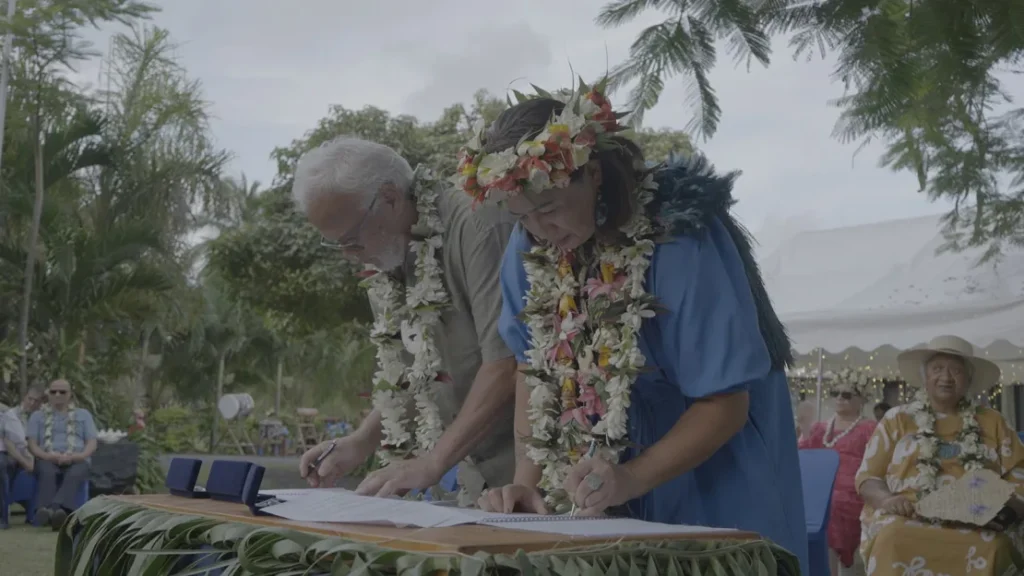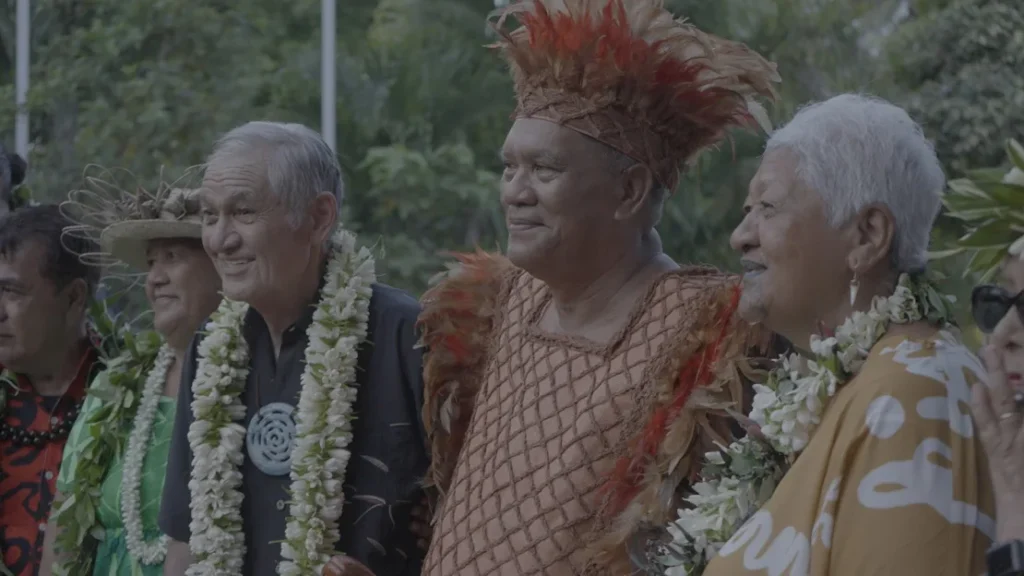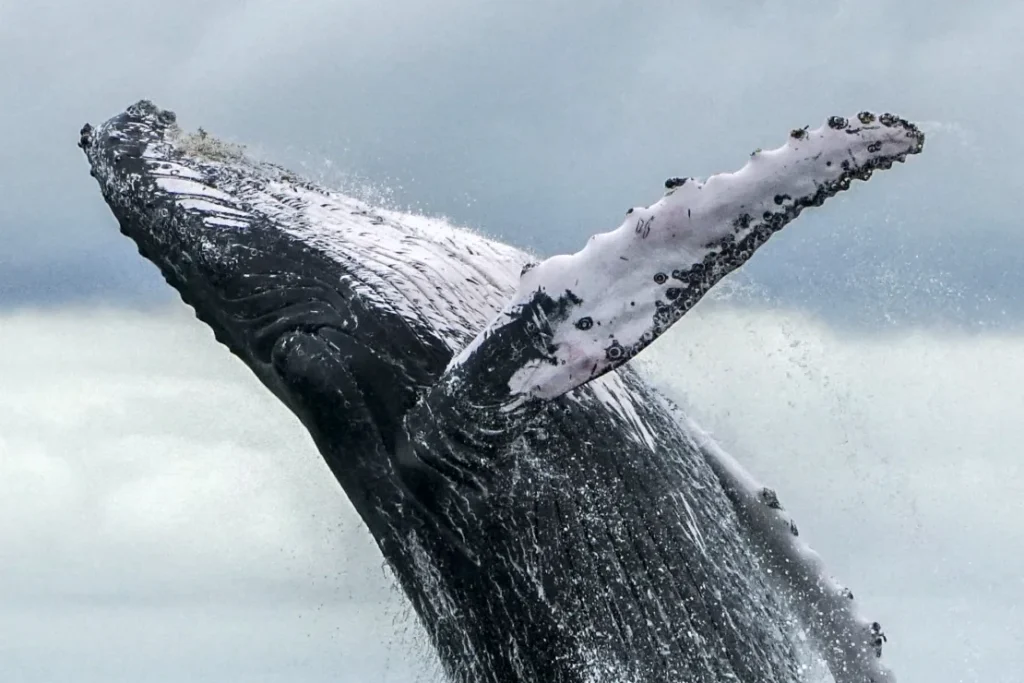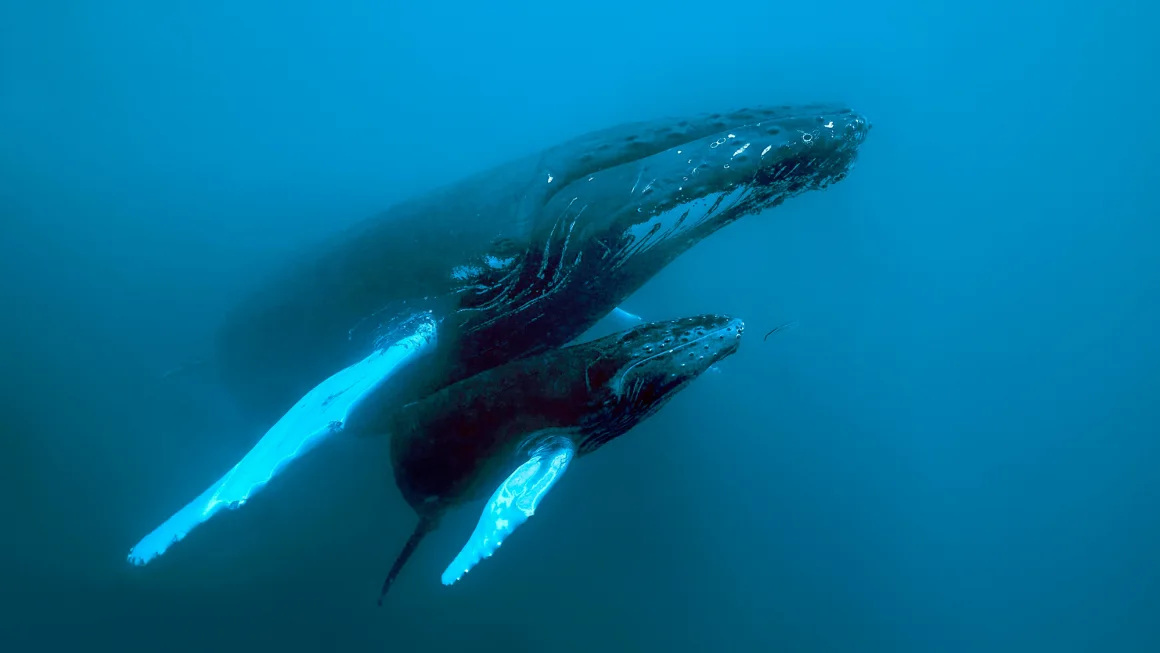Māori conservationist Mere Takoko views losing a whale as losing an ancestor. She emphasizes that whales have long been teachers, guiding Pacific navigation, especially across the Milky Way, passing knowledge down through generations.
From Rangitukia, a small town on New Zealand’s east coast, Takoko leads a movement among Indigenous groups in the Pacific to protect these majestic marine mammals. They are working on a historic treaty to grant whales legal personhood with inherent rights.
This treaty is part of a broader effort to ensure whale protection. It includes recognizing whales as crucial players in ocean health, valued for their role in reducing carbon, and using advanced technology to monitor and deter vessels that harm them.

The document, known as the Declaration of the Ocean, proposes granting whales the status of legal persons. This designation aims to protect them from mental distress caused by human activities and ensures they live in a clean environment free from pollution, overfishing, ship collisions, and climate change impacts.
The signing in March comes at a critical time when six of the 13 great whale species are endangered or vulnerable. Every year, around 300,000 whales and dolphins are accidentally caught in fishing nets, according to the World Wide Fund for Nature (WWF). Some species, like the North Atlantic right whale, have fewer than 360 individuals left.
Mere Takoko, a leader in conservation and vice president of Conservation International Aotearoa, heads the Hinemoana Halo Ocean Initiative. This initiative aims to revive populations of sacred species, focusing on whales. Aotearoa is the Māori name for New Zealand, and Takoko has ancestral ties to the Ngāti Porou, Te Whānau a Apanui, and Rongowhakaata tribal nations. She is experienced in climate change and has advised the New Zealand government in the past.
In the coming months, Takoko plans to work with Pacific countries to discuss legislation granting whales personhood. She looks forward to making progress at the Commonwealth Heads of Government Meeting in Samoa in October, which will be attended by Britain’s King Charles III.
Takoko and her team are optimistic about their initiative, drawing inspiration from past successes. In 2017, Māori efforts secured legal personhood for New Zealand’s Whanganui River after a lengthy struggle.
Since then, there has been significant progress in revitalizing the river. A major port project, starting in 2023 and funded with millions of dollars, aims to improve the river’s health and harbor activity, according to CNN affiliate RNZ. Additionally, a strategy group of 17 members, including Indigenous leaders, mayors, and conservationists, was formed to promote the river’s well-being and secure government support.
In response to CNN, New Zealand’s Ministry of Foreign Affairs and Trade and the Cook Islands’ Office of the Prime Minister acknowledged that the He Whakaputanga Moana initiative was developed independently by Indigenous groups, separate from government involvement.
The Wellington ministry emphasized that New Zealand already has strong domestic laws protecting whales and advocates internationally for their conservation through the International Whaling Commission.
The Cook Islands office mentioned they have not yet received a formal proposal from Indigenous leaders regarding the declaration’s implementation.
To advance the campaign for whale personhood, Takoko has gathered a diverse team of global experts.

Michelle Bender, a legal counsel based in Seattle working with Ocean Vision Legal, explains that granting whales personhood doesn’t mean they have human rights. Instead, it means acknowledging they have specific rights and responsibilities under the law.
“It’s about recognizing that these creatures have inherent worth and deserve protection, regardless of how humans might benefit from or use them within the ecosystem,” Bender explained to CNN.
“Personhood ensures that human interests don’t always take priority over whales’ interests… Their well-being should be seriously considered in decisions and conflicts that affect their health.”
Safe Havens for Whales :
Before human activities and whaling, scientists estimate there were between 4 million to 5 million whales in the oceans. Today, that number has dropped to just over 1 million.
Commercial whaling in past centuries severely reduced whale populations, though most countries have now halted this practice. Japan, however, continues controversial “scientific” hunts despite global opposition.
Each year, about 20,000 large whales are killed in collisions with ships alone, experts report. Whales also face threats from getting caught in fishing nets and the impacts of climate change.
Global ocean temperatures have been consistently reaching new record highs, affecting marine life profoundly. Carlos Duarte, a prominent marine ecologist from King Abdullah University of Science and Technology, notes an increase in whale deaths due to starvation caused by reduced ocean productivity in warmer waters.
In addition to recognizing whales’ intrinsic value, some experts advocate assigning a monetary value to these animals. Ralph Chami, the initiative’s chief economist based in Washington, DC, argues that this valuation would acknowledge whales’ ecological contributions and the economic benefits they provide.

Ralph Chami, speaking to CNN, highlighted that many people typically assess the value of nature only when it’s no longer alive. He gave an example: when asked about the worth of a live salmon, most might only consider its value on a dinner plate, around $50, without considering its value swimming freely in the ocean.
In a publication with the International Monetary Fund (IMF), Chami estimated that a living whale holds a value exceeding $2 million, based on the carbon it absorbs throughout its lifetime.
Scientists and marine experts emphasize the critical role of whales in the ocean’s carbon cycle. They act as nutrient pumps, consuming deep-sea nutrients and releasing them near the surface through their waste. This supports phytoplankton, which produces about half of Earth’s oxygen and absorbs large amounts of CO2, akin to four Amazon rainforests.
Mere Takoko highlighted that the Pacific Ocean serves as the world’s largest carbon sink. Through their initiative, they aim to restore essential ocean habitats, emphasizing the crucial role whales play as ocean “bioengineers.”
According to marine ecologist Carlos Duarte, assigning a monetary value to whales sets the stage for imposing penalties on those responsible for harming them. The Hinemoana Halo team proposes that by recognizing whales as legal persons valued at $2 million, shipping companies and insurers could be held financially responsible for any harm caused to them.
To enforce accountability, Takoko’s team advocates integrating technology into ships to prevent collisions and entanglements with whales.
Emily Charry Tissier, CEO of Whale Seeker, a Canadian startup focused on monitoring marine mammals, noted the existing potential of technologies like artificial intelligence, drones, and infrared cameras to detect whales and avoid accidents.
She stressed that these tools are available today and could significantly reduce instances of harm to marine life.
A Challenging Journey :
The Hinemoana Halo Ocean Initiative faces a long journey to secure legal recognition for whales as persons.
Achieving support from nations and the global community is crucial for this initiative. One major challenge is integrating new technology into existing ships. Despite these obstacles, the team remains hopeful. They believe that once insurance companies understand the financial risks involved, adopting this technology will become essential.
“Ships equipped with this technology could see lower insurance costs. Investors would also favor them for their ‘whale-safe shipping’ reputation,” explained Chami to CNN.
Although implementing this technology worldwide is daunting, Duarte believes that protecting significant shipping routes where ship strikes and entanglements occur frequently will become feasible once several major countries pass personhood laws for whales.
Take the Cook Islands, for example. Despite having fewer than 20,000 residents, its marine territory covers over 2 million square kilometers (772,000 square miles). Carlos Duarte told CNN that if Pacific nations pass personhood laws for whales, it would protect a significant part of the world’s oceans.
The team is hopeful because the global community is committed to protecting marine life in international waters. Nearly 200 countries agreed to a binding treaty at the United Nations last year, aiming to safeguard 30% of Earth’s land and oceans by 2030, as reported by CNN.
Duarte explained, “It typically takes about two decades from introducing these policies to seeing their positive effects. This shows what we need to do for a healthy ocean.”
The recovery of humpback whales is a remarkable example of ocean restoration. After being severely reduced by whaling from the late 1700s to the mid-1900s, their population has bounced back from around 200 individuals to over 60,000 today, according to Duarte. This recovery followed a global ban on commercial whaling by the International Whaling Commission in 1986.
“If we can bring back humpback whales, we can restore almost any part of the ocean,” Duarte said confidently.
Mere Takoko shared his optimism, saying, “The passion of Polynesia’s traditional leaders has sparked a movement. With community support, I believe we will succeed in our goals.”
Take the Cook Islands, for example. Even though it has fewer than 20,000 people, its marine area covers over 2 million square kilometers (772,000 square miles). Carlos Duarte told CNN that if Pacific countries pass laws recognizing whales as legal persons, it would protect a large part of the world’s oceans.
The team is hopeful because the global community wants to protect marine life in international waters. CNN reported that nearly 200 countries agreed on a binding treaty at the United Nations last year. They aim to protect 30% of Earth’s land and oceans by 2030.
Duarte explained, “It usually takes about twenty years from when these policies are first introduced to see their positive effects. This shows what we need to do to make sure our oceans stay healthy.”
The amazing recovery of the humpback whale shows how we can restore oceans. Carlos Duarte said that after being severely reduced by whaling from the late 1700s to the mid-1900s, their numbers have grown from about 200 whales to over 60,000 today. This happened after the International Whaling Commission banned commercial whaling in 1986.
“If we can bring back humpback whales, we can fix almost anything in the ocean,” Carlos Duarte said.
Mere Takoko agreed, saying, “Traditional leaders in Polynesia have started something powerful. With everyone supporting us, I believe we can make this plan succeed.”





